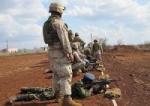I have been closely following the MTT debate the past 2 years because it has been having a major impact on company grade officers, and will likely continue to do so.
The two main debates I pick out are: 1. Should we be advising? and 2. Who should be the advisers?
1. The first debate seems to have been resolved, and the Army has accepted that we will need to train and advise foreign nations so their security forces can take over and we can leave.
2. The second issue is much more heated and still unfolding. LTC Nagl calls for an Advisor Corps, which permanently trains and advises foreign nations. Some argue that BCTs can do it as part of their full-spectrum capabilities. Others argue that SF should do it. I think the realistic answer is that a combination of all 3 of these will continue.
First, Advisor Corps. This would be a great idea, but I don't know if it is realistic due to manpower, skills required, and personnel issues. Currently, MTT's are officer and senior NCO heavy. An Advisor Corps of 20,000 officers and senior NCO's would drain the conventional force. Finding 20,000 that are qualified and have the motivation to do it would be a further challenge. Right now, MTT's are ad hoc and largely based on dwell time. Thousands of officers and sgts are not volunteering for these assignments. One friend told me, "If I wanted to advise Iraqis, I would have submitted a packet (SF packet)." One branch was offering choice of duty AND grad school, but could not fill slots. Now because those follow-on assignments are filled, branch will try to get you a top 5 choice. Further, on the officer side, Captains want to command. The MTT is not a command track assignment, and an Adviser Corps with 2-3 year duty, delays the captain's chance to command. As the Major boards are coming earlier and earlier, this will create two tiers, those who commanded right away, and those not as lucky. We all know that despite what the Army says, command is more important than any other job. Maybe not right, but reality.
BCTs. To build internal MTTs, the BCT could task each BN with one team, or could pull up the manpower for centralized Brigade Level control and training. The manpower crunch of CPTs, MAJ, SFC's, and MSG's would definitely hurt the BNs and Brigade. To train these teams, the BCT would need to pull external resources, or send their pax to a centralized school. Standards and doctrine need to be published to allow units to train the MTT mission if it is to become a METL task. The only upside to this is cohesion, as there is increased chance these pax have worked together before, though this is not guaranteed.
SF. I am not an expert in this realm, but I know that training local forces is a SF mission. The problem in Iraq and Afghanistan is the sheer number of forces that need training and advising. The benefits of SF units are obvious; there are just not enough of them.
Where does this leave the Army? Not in a good spot. Right now, we're using a combination of these 3 methods. A centralized Advisor Corps would probably be the best solution, but I do not think it is realistic with the force we have today. It is probably the hard right, but I do not think it will happen.
This was the result of mulling over the article during PT run this morning, hopefully it makes some sense.














Bookmarks